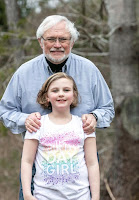Professor Hank here offering for your consideration my top five lessons learned from our just concluded election.
Lesson 1
We need a national civics lesson. In many ways, this election was no different than any other in recent memory.
So, we should be concerned that so many of our friends, neighbors, and family members -- and apparently even our current President and at least some of his supporters -- don't understand the process.
The media does not decide the final outcome of an election. It does, however, make projections on probable winners based on turnout, historical and day-of voting patterns, and the chances of one candidate overtaking the other given the number of ballots still to be counted.
They're also very cautious about making projections. For example, NBC's standard for making a call this year was 99.5% certainty.
Absentee/mail in ballots can sometimes be inputted for several days after the election itself to account for delivery delays. This includes ballots from our overseas military. In the vast majority of past elections, their numbers were too small to impact final results. This year they did,
Final vote totals are often not officially "certified" until several weeks after an election. Nonetheless, most candidates -- including President Trump in 2016 -- claim victory on Election Night based on projections, trends, and their own internal campaign information.
Four years ago this week, President-elect Trump was meeting with President Obama to discuss the transition. I don't recall anyone saying "Hey, wait a minute, the vote totals aren't certified."
Historically, most allegations of fraud don't stand up under close examination. They also rarely, if ever, involve the number of votes required to change an outcome. Lawsuits that challenge procedural issues don't nullify actual votes.
The concept that every vote needs to be counted, no matter how long it takes, is essential to our democracy. Given the size of the turnout and the number of options we had to vote this year, there was nothing sinister or underhanded about taking extra time to be sure every ballot was counted.
That's how it should be.
Lesson 2
Social media and the internet have become a mosh pit of mis- and dis-information. Some of what's posted and shared is merely uninformed or naive. But during this election season, we've also seen claims and allegations that were malicious and knowingly false.
The problem isn't limited to government and politics. It impacts every business and industry; groups of people, and individuals.
So called "big tech" struggles between protecting our right to free speech and the spread of information that is purposely designed to mislead and misinform.
At least part of the answer rests with us as consumers. We need to check the sources of items we see that don't seem right. We also need to challenge those who post damaging and false information.
It's amazing how quickly they disappear or resort to name calling, because they can't defend their positions. I can't tell you how many times I've been called a "moron" these last few weeks!
Lesson 3
After some early hand wringing about the polls being inaccurate, they ended up fairly close to the results in the race for President.
But there are issues.
First, the public too often focuses on the headlines and not the fine print, such as margins of error. Many reputable pollsters predicted that vote totals in certain states would be close. And they were.
Second, polls are not designed to discourage voters on one side or another. The old cliche that the only poll that counts is the one on Election Day is as true as ever. If someone stays home because of a poll, shame on him or her.
Third, it would seem that some people, who intended to vote for certain candidates, were telling researchers something different. This isn't a problem with sample size, question design, or participant selection. It is an issue with respondents not honestly answering the questions.
There's a term emerging for these folks. They're being called "shy voters."
The bottom line is that polling/market research is only as good as the honesty of the people who participate.
Lesson 4
President Trump deserves credit for being the disrupter we all needed. His presence and policies have forced us to consider what we believe about science and medicine; the environment; economics; those who are different than us, and what our responsibilities are to each other as citizens.
We apparently have very different views on those topics. As historian Jon Meacham noted on the Today Show: "Democracies don't work without empathy."
Lesson 5
It took a pandemic to do it, but we may have found the answer to voter apathy. Making voting more convenient -- increased emphasis on absentee/mail in voting; opportunities to drop off ballots, as well as voting early -- resulted in record turnout.
Going forward, the process will no doubt become smoother and more uniform. Hopefully more voters across the spectrum will participate.
We may even get the final results faster.












